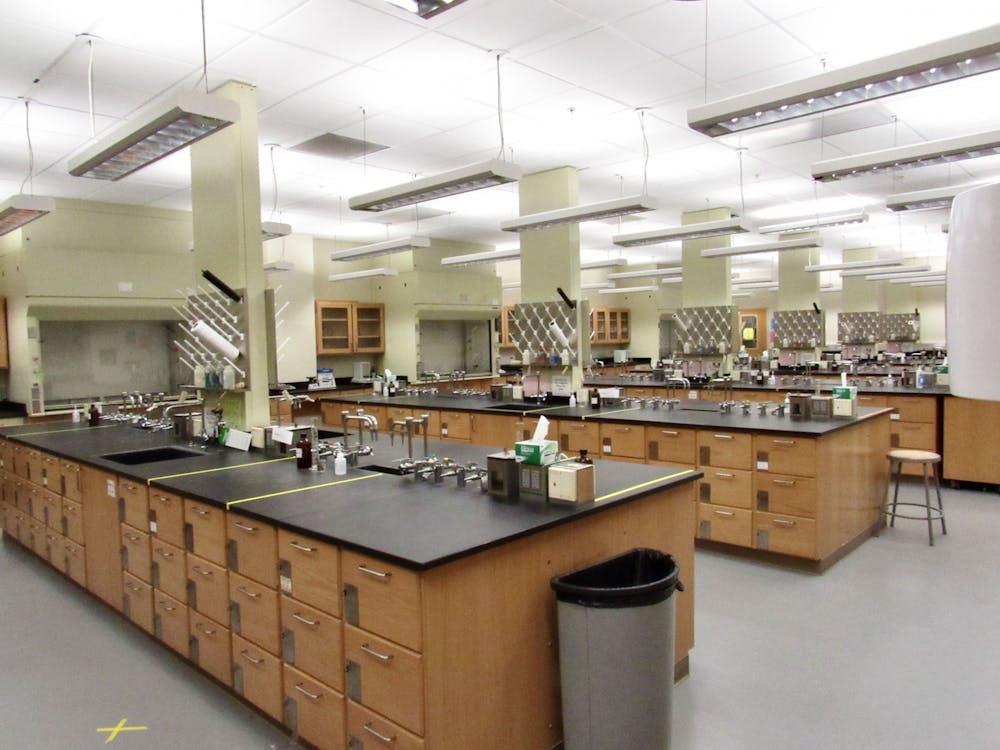Graduate students are an integral part of the University’s functioning and impact. Through their various roles, both faculty and undergraduates are supported by the efforts of graduate students.
Despite the necessary roles that graduate students take on for their entire academic community, they are loaded with a student service fee.
This "hurdle" grew in the summer of 2021, unbeknownst to graduate students. At the start of the summer, the service fee increased by 66% from $350 to $582.
In addition to completing their own course requirements and research tasks graduate students instruct many undergraduates.
Benjamin Jackson, Ph.D. candidate in the department of chemistry and biochemistry, said graduate teaching assistants in chemistry teach all lower-level instructional labs and assist in the functioning of upper-level labs.
“In other departments, graduate students are often primary instructors for lower-level lecture courses and play a direct role in the educational services of this university,” Jackson said.
According to Jackson, graduate students support the University in name and reputation through the performance of research activities within the institution.
“This work alongside faculty and staff leads to the acquisition of grants and directly impacts the academic prestige of the University,” Jackson said.
Though $582 may seem affordable to some, it is not practical for all graduate students at Auburn University.
Colby Muir, graduate student in mathematics, broke why he felt the cost of the increased student fee was illogical.
Graduate students are paid half of their stipend at the end of August, at which point September bills are starting to hit.
“And by the time that you are done paying off the [fall] E-bill with your student service fees, … your insurance and your parking … it's November and you get hit with your spring E-bill because you just registered for classes," Muir said.
Muir said graduate students end up owing Auburn around $1,200 a semester in fees. For some, this is in addition to of tuition. As a result, many graduate students spend their entire academic year trying to catch up.
Over 600 students and faculty voiced their recognition of graduate students as both educators and scholars alike, noting their dedication to further develop both research and education in a petition developed by the Graduate Student Council.
In addition to the fact that there was no communication to the graduate students of this increase prior to the charge, the raise was compounded by the increasing cost of living in the city of Auburn and the lack of an increase in graduate stipends, which has remained the same for many departments over the years.
As is, Jackson said graduate students do not receive automatic cost of living raises. Additionally, there is currently no public plan to address these worsening financial conditions, he said.
“Personally, the rising student fees has been a source of significant stress and financial strain,” Jackson said. “In the four years I’ve been a graduate student I’ve seen the student fees increase over 50% with no corresponding changes to the GRA/GTA stipend to adjust for this.”
According to Auburn graduate students, this fee has become a significant economic hurdle and has subsequently hurt graduate students.
“Work as a GRA/GTA is often incredibly demanding," Jackson said. "While we’re employed as part-time employees, between teaching assistant responsibilities and the research work necessary for our graduation, it’s extremely common for graduate students within [the department of chemistry and biochemistry] to have 50+ hour work weeks."
However, they can rarely make ends meet working just as a GRA/GTA.
"Graduate students on stipend currently make below the cost of living for the city of Auburn,” Jackson said. “As a result, myself and many others frequently need to seek additional employment to make ends meet.”
Some graduate students are forced into even more perilous positions.
“This problem is worsened further for international graduate students who, on top of the current fees, are charged an additional international fee and are legally prohibited from seeking secondary employment,” Jackson said.
International students with an F-1 visa are prohibited from working off campus during their first year, and any subsequent off-campus employment must be related to their field of study.
The raise has an impact on more than just graduate students.
“Graduate students needing to work second or third jobs just to pay their bills have less time and energy to devote to an already demanding GTA/GRA job. As this situation worsens, Auburn may find it harder and harder to recruit talented graduate students to their program,” Jackson said.
Isabel Harris, graduate student in mathematics, said that undergraduate students are also impacted, as graduate students likely teach some of their classes, grade their papers or hold office hours to provide additional instruction.
“This is a community," Harris said. "And even if it's not a member of the community that's in the exact same position as you, you can care about what's going on.”
Many graduate students raised concerns and $100 was refunded to students in response; however, graduate students are asking for more.
One of their demands is clear communication.
“I still want to know what services those are," Muir said, referring to the increased student service fee. "I've walked into RBD maybe twice this semester. I've walked into the Rec Center not at all. So if these are programs that you're doing or services that you're doing, why can't I just opt-in or out of them and pay the fees accordingly."
According to Jackson, over 150 professors, lecturers, staff and administrators publicly voiced their support by signing the petition. However, Jackson said other administrators dismissed recommendations entirely.
Others have faced obstacles when advocating for these changes, including a general lack of transparency that has made it challenging for students to effectively direct their requests.
“Students don't have the contacts [for those making the] financial decisions that are being made [about] hundreds of graduate students, which is pretty concerning,” Harris said.
Do you like this story? The Plainsman doesn't accept money from tuition or student fees, and we don't charge a subscription fee. But you can donate to support The Plainsman.

Regan Moss, senior pursuing concurrent degrees in microbiology and neuroscience, is a columnist for The Plainsman.





